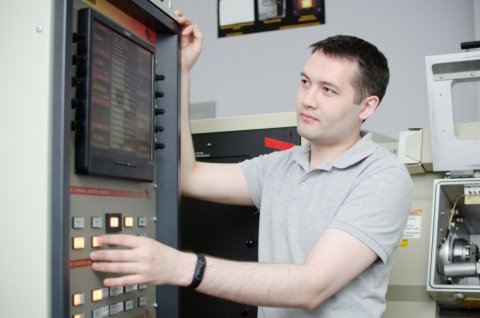South Ural State University is famous for educating future engineers not just for the region but for the whole country. Special attention is paid to educating specialists for the metal-working industry, the professional education for which is held at the laboratory of Physical Modeling of Thermomechanical Processes (Experimental Engineering National Research Institute) under leadership of Aleksandr Akhmedyanov.
The laboratory models thermomechanical processes on various steels and metal alloys. The laboratory’s staff studies the deformation behavior of steel allows in the manufacturing process and the implementation of finished products.
“All products undergo some kind of thermodynamic action. We study these thermodynamic processes which occur in metal and, thereby, we can control the course of production, reduce its cost, or improve the final mechanical characteristics of finished products,” says Aleksandr Akhmedyanov.
The laboratory works with major manufacturers for Russian and international businesses. In just Chelyabinsk, testing clients include: ChMK, ChTPZ, RosNITI. And the firm Kompozit (Korolev), the All-Russian Research Institute of Aviation Materials (VIAM Moscow) and more.
.jpg)
“Not too long ago we worked on a nickel-chrome alloy with Kompozit and ChMK. With VIAM and the American company Alcoa – third largest manufacturer of aluminum (author’s note) – we have had some work with aluminum alloys. We are working on studying pipe steel with ChTPZ and RosNITI,” explains the laboratory head.
Sergey Samoylov, engineer of the laboratory of Physical Modeling of Thermomechanical Processes, says that the advantages of such laboratories are that a large amount of necessary research is held by researchers on small laboratory samples:
“For example, if we are studying the rolling process, we don’t need to roll several tons of metal. With literally a few kilograms of material we obtain the necessary results. This allows the manufacturer to significantly save their raw materials and finances.”
The Laboratory of Physical Modeling of Thermomechanical Processes was founded 5 years ago using the Gleeble 3800 testing complex. There are only 8 of such machines in Russia and they are located in Moscow, Saint Petersburg, and Magnitogorsk.

The main differentiating factor of such machines from their “brothers” is that they have four replaceable modules. One of them connects to the main power block which supports the loading and heating of the metal. The modules have the same operating principle: a sample is placed in the chamber, clamped, and heated using a current. All of this happens in the work chamber, where there is a vacuum or protective gas. The modules differ by the form of deformation: there is a module for compression, for tension, for torsion, and for complex forms of deformation.
“Metal deformation is changes to the relative position of the body particles associated with their movement relative to one another. Typically, in torsion and tension, we destroy the sample. For compression, we just need to obtain the pressure under which the metal is compressed. After completed a test we also study the microstructure of the samples. Depending on the goal of the study, we use different modules,” explains Aleksandr Maratovich.
The metal testing process happens in this way: the researchers take the sample and weld a thermocouple to it. A thermocouple is a wire for measuring the sample’s temperature. Then, they place the sample in the chamber, pump the air out of it, and write the testing program on a special software. Next, the researchers start the machine, and the whole process is controlled by the computer. The laboratory staff only needs to watch carefully for the data received. According to Aleksandr, it is almost never necessary to intervene in the process of work.
“I myself was still studying when they opened this laboratory. From a whole stream of people, they chose just a few who would work here. We trained thoroughly – we completed internships in Saint Petersburg and adopted the experiences of specialists from the USA who put our complex together and tested it. We also visited the manufacturing firm of the Gleelbe 3800,” says Aleksandr Akhmedyanov.
At this time, laboratory staff are working with companies to solve current technological manufacturing issues. The laboratory researchers are studying this issue thoroughly and will suggest a few possible solutions to the factory leadership. These university laboratory partnerships with real, acting manufacturers are very promising for future development.




